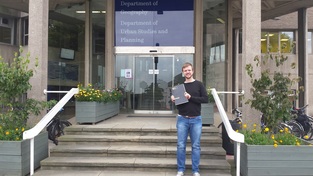 The finished article outside the Geography Department at Sheffield. The finished article outside the Geography Department at Sheffield. The dust (or I should probably say ash) has settled and I am now over a week on from passing my viva with the "most minor of minor corrections", a most relieving and pleasing result. The lead up to a PhD viva is a little bit surreal. After spending 3 years on research, going to conferences, writing papers, drinking way too much coffee (and accompanying biscuits), and finally spending 3 months writing up your work, it is a strange feeling knowing that your research is going to be critiqued and discussed in a matter of only a few hours. Of course, the examiners spend a long time looking through your work, but having 3 years of your work condensed into a 2 hour discussion barely scratches the surface! However, something I didn't realise until participating in my own viva is that it is not all about discussing every minutiae of your work. The examiners are looking for two main things when your are in your viva: (1) Did you do the work yourself? (2) Do you know what you are talking about (i.e. do you know the science behind your work)? With this in mind how do you prepare for your viva? This is something that I asked quite a few people and I came to the conclusion that it can vary dependent on the subject area you are in and your potential external examiner. Personally all I did was re-read my thesis in the couple days before. Essentially, you should have absolutely nothing to worry about if your wrote your thesis yourself and did all the research. In my case I was relatively happy I met the criteria. Although, I am sure it is probably a good idea to re-read some key papers surrounding your thesis and certainly some of the papers of your external examiner. Next step, getting an academic job which doesn't involved moving every 6 months! Comments are closed.
|
Archives
July 2023
|

 RSS Feed
RSS Feed